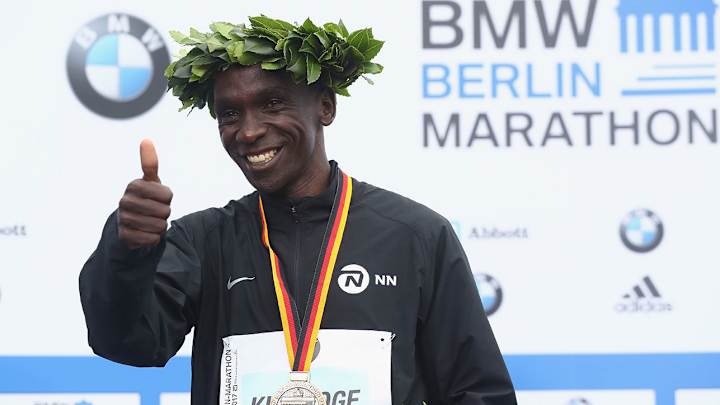Can Eliud Kipchoge Break the Marathon World Record At Sunday's Berlin Marathon?

Though Eliud Kipchoge is the greatest marathoner in history, the Olympic champion from Kenya doesn't hold the world record. But that could change on Sunday at the Berlin Marathon.
Only eight seconds separate Kipchoge's personal best with the world record. And while Kipchoge is hesitant to talk about making history, he'll have a good shot
"Training has been going well," Kipchoge told SI.com. "This year, I'm not talking about the world record but I'm thinking about a personal best. There's not much that is different of what I am doing. Still with the same program. Still the same coach. Still the same training area."
Since 2014, the marathon world record of 2:02:57 has belonged to his compatriot Dennis Kimetto. While Kimetto's performance declined since that run, Kipchoge established himself as the best and finished 2015 and 2017 as the fastest in the world. His personal best of 2:03:05 was set in his win at the 2016 London Marathon, which would've been the fastest time of that year had longtime rival Kenenisa Bekele not run two seconds faster in Berlin that fall. Kipchoge opted to win gold at the 2016 Olympics in Rio instead of a fall marathon in 2016 and then bypassed the spring marathon season to participate in Nike's Breaking2 attempt at shattering the sub-two hour marathon barrier. Kipchoge ended up running 2:00:25—the fastest someone has ever run 26.2 miles. But due to the use of alternating pacers and fueling strategy, the Breaking2 attempt wasn't eligible for the world record.
At 33 years old, Kipchoge hasn't shown any signs of letting up. Last September, he attempted to break the world record in Berlin, but wet conditions slowed his pace, though he still won the race in 2:03:32. Unusually warm conditions for this year's London Marathon in April didn't slow Kipchoge from running 61:00 for the first half, but he couldn't maintain his pace down the stretch. Kipchoge won by 32 seconds, finishing in 2:04:17.
"Eliud is in good shape, but he has been in good shape before,” his agent Valentijn Trouw told LetsRun.com. “Of course, he wants to go out fast and go for a fast time, but it depends on the conditions on the day of the race. It will be the conditions on the day that will decide how the race will go.”
That's the thing about marathon training: no matter how well you prepare, extreme conditions can change everything. (Just ask anyone who ran this year's Boston Marathon.) As of Wednesday afternoon, the forecast for race day in Berlin shows 57°F with 70% humidity for the start. The high of 71°F is not expected until 2 p.m.
• FROM 2017: Eliud Kipchoge on Breaking2, the Future and His Love for Running
Aside from Mother Nature, can anyone challenge Kipchoge or push him to the finish line? Perhaps his top competitor is Wilson Kipsang, the only person to ever beat him in a marathon. Kipsang ran a then-world record of 2:03:23 at the 2013 Berlin Marathon, beating Kipchoge by 42 seconds. Kipsang dropped out of last year's Berlin Marathon after about 30K due to stomach issues. He rebounded by taking second at the New York City Marathon but then dropped out of the 2018 Tokyo Marathon in February while attempting to defend his title. The next-best runners on paper are Kenyans Eliud Kiptanui, who was second to Kipchoge in 2015, and Amos Kipruto, but neither has broken 2:05 in their career.
Kipchoge may not hold the world record—at least not yet—but he's won in Berlin, London, Rio and Rotterdam. He has repeatedly demonstrated what the human body can do under optimal conditions. There's very little left for Kipchoge to prove, but he would be a worthy record-holder.
"The reason I keep going is because I love the sport and I want to keep up a very good legacy that I can pass onto the next generation," Kipchoge told SI. "I'm still going on and I'm still doing good things."

An avid runner, Chris Chavez covers track and field, marathons and the Olympics for Sports Illustrated.